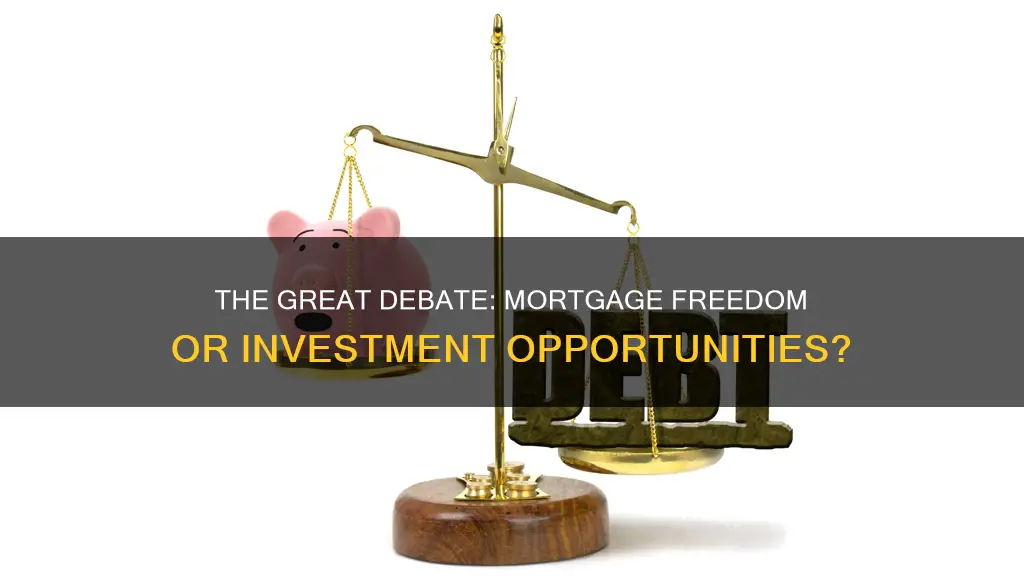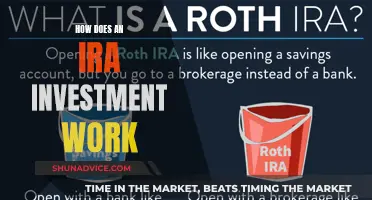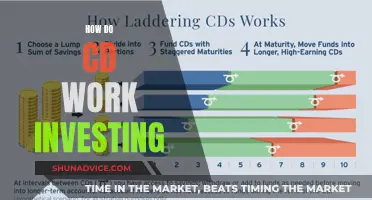
Paying off your mortgage or investing extra cash is a common dilemma for homeowners. While there is no one-size-fits-all answer, there are several factors to consider when deciding what to do with extra money. These include your mortgage rate, risk tolerance, expected investment earnings, and individual financial goals.
Paying off your mortgage early can save you thousands of dollars in interest and give you peace of mind. It can also increase your equity, which can be leveraged for a home equity loan or line of credit. However, paying off your mortgage early may result in opportunity costs, illiquidity, and loss of tax deductions.
On the other hand, investing in stocks, bonds, or mutual funds can potentially provide higher returns than the average mortgage interest rate. These investments are also more liquid, meaning they can be easily converted to cash if needed. Additionally, investing in a retirement account may come with perks like employer matching and tax breaks. However, investing carries a higher risk of losses and does not eliminate your debt.
Ultimately, the decision to pay off your mortgage or invest depends on your financial situation, risk tolerance, and personal preferences. Consulting a financial advisor can help you assess your options and make a decision that aligns with your goals.
| Characteristics | Values |
|---|---|
| Interest savings | Paying off your mortgage early can save you thousands or tens of thousands of dollars in interest payments. |
| Peace of mind | Paying off your mortgage early can ease your burden and prevent the risk of losing your home to foreclosure. |
| Build equity | Paying down your mortgage faster means building equity in your home more quickly, which can help you qualify for refinancing. |
| Opportunity cost | Any extra money you spend on paying down your mortgage faster is money you aren’t able to use for other financial goals. |
| Wealth is tied up | Property is an illiquid asset, meaning you can’t convert it to cash quickly or easily. |
| Loss of some tax breaks | Paying down your mortgage instead of maxing out your tax-advantaged retirement accounts means giving up those tax savings. |
| Higher returns | The stock market has, for many years, provided higher average returns than mortgage rates. |
| Liquid investment | Stocks, bonds and other market investments mean you can easily sell and access your money if you need to. |
| Employer match | Investing in a retirement account may allow you to take advantage of perks like employer matching and tax breaks. |
| Higher risk | There is more volatility in the stock market than in the housing market. |
| Increased debt | Choosing to invest your money may not be the best option if you don’t like the idea of having debt to your name. |
What You'll Learn
- Paying off your mortgage early can save you thousands of dollars in interest
- Paying off your mortgage early can give you peace of mind
- Paying off your mortgage early can help you build equity
- Investing can give you higher returns than paying off your mortgage early
- Investing can give you greater liquidity than paying off your mortgage early

Paying off your mortgage early can save you thousands of dollars in interest
For example, let's consider a scenario where you have a mortgage of $200,000 with a fixed interest rate of 3.5% for 30 years. If you pay off this mortgage 10 years early, you would save around $20,000 in interest. The higher the interest rate, the more you will save by paying off your mortgage early.
Additionally, paying off your mortgage early can provide peace of mind and reduce financial stress. It can be liberating to own your home outright and no longer have to worry about monthly mortgage payments. This can be especially beneficial if you are risk-averse and prefer the certainty of paying off debt over the potential volatility of investments.
Furthermore, paying off your mortgage early can help you build equity in your home faster. This can be advantageous if you want to refinance or take out a home equity loan or line of credit to access cash for other financial goals or home improvements.
However, it is important to consider the opportunity cost of paying off your mortgage early. By doing so, you may be foregoing the potential for higher returns by investing in the stock market or other investment vehicles. Additionally, paying off your mortgage early may result in the loss of certain tax deductions and reduce the liquidity of your assets, as accessing the equity in your home may be more challenging than selling stocks or other investments.
Ultimately, the decision to pay off your mortgage early depends on various factors, including your financial situation, risk tolerance, interest rate, and investment opportunities. It is a good idea to consult a financial advisor to help you weigh the pros and cons and make a decision that aligns with your goals and comfort level.
Who Invests and Why?
You may want to see also

Paying off your mortgage early can give you peace of mind
If you're debt-averse, paying off your mortgage early can be a good idea. It's a more predictable option than investing, as you know exactly how much you're saving and when you'll be debt-free. It's also a safer option, as there's no risk of losing money.
Paying off your mortgage early can save you thousands of dollars in interest. The sooner you pay off your mortgage, the less interest you'll pay overall. This can be especially beneficial if you're in the early years of your mortgage, as that's when most of your payment goes towards interest. By paying off your mortgage early, you can avoid paying a large chunk of interest over the life of the loan.
Additionally, paying off your mortgage early can increase your financial flexibility. Once you're no longer making mortgage payments, you'll have more money to invest in your future, personal hobbies, or other financial goals. You can also leverage the equity in your home to take out a home equity loan or line of credit, which can be used to accomplish other financial goals or make improvements to your home.
However, there are some potential drawbacks to consider. Paying off your mortgage early may result in prepayment penalties, and you'll lose out on tax deductions for mortgage interest. Additionally, the money you put into your mortgage becomes illiquid, meaning it's not easily accessible. If you experience a financial emergency and need cash, you may have to sell your house.
Ultimately, the decision to pay off your mortgage early depends on your financial situation, risk tolerance, and personal preferences. Consult a financial advisor to help you assess your finances and make the best decision for your circumstances.
Should You Invest in Sovereign Gold Bonds?
You may want to see also

Paying off your mortgage early can help you build equity
However, it's important to consider the potential drawbacks of paying off your mortgage early. Your wealth and liquidity may be tied up in your property, making it challenging to access funds quickly in case of emergencies or other investment opportunities. Additionally, you may miss out on potential higher returns from investing in the stock market or other financial instruments. Therefore, it's crucial to weigh the benefits against the opportunity cost of paying off your mortgage early.
Restaurant Investment: Worth the Risk?
You may want to see also

Investing can give you higher returns than paying off your mortgage early
While paying off your mortgage early can have benefits, investing your money instead may generate higher returns than the loan's interest cost. The stock market has historically returned an average of about 10% annually, and the S&P 500 has returned an average of 10% to 11% annually since its inception in 1926 through 2018. If you invest in the stock market, you could potentially earn a higher rate of return than if you pay off your mortgage early.
For example, let's say you have a 30-year mortgage of $200,000 with a fixed rate of 4.5%. Your monthly payments would be $1,013, and you'd spend a total of $164,813 in interest over the life of the loan. Now, let's say you're able to come up with an extra $300 per month. If you put that extra money towards your mortgage, you'd save $67,816 in interest and pay off your mortgage 11 years early.
However, if you invest that $300 per month in an index fund that tracks the S&P 500, you could potentially earn a much higher return. At the end of 19 years (the length of time it would take to pay off your mortgage early), you would have $160,780. That's more than double your potential interest savings from paying off your mortgage early. Even after paying off your mortgage, you'd still have $55,293 left over.
Another benefit of investing is liquidity. Investments such as stocks, bonds, mutual funds, and ETFs are highly liquid, meaning you can sell them easily and access your money if needed. On the other hand, if you pay off your mortgage early, your money becomes illiquid, and it won't be easy to access that equity unless you take out a second mortgage, do a cash-out refinance, or sell your home.
Additionally, if you invest in a retirement account, you may be able to take advantage of perks like employer matching and tax breaks. For example, if your employer matches your 401(k) contributions, you can essentially earn free money on top of the returns on your investments.
However, it's important to consider your risk tolerance when deciding whether to invest or pay off your mortgage early. Investing in the stock market comes with higher risk and volatility, and there is always the potential for losses. If you're uncomfortable with the idea of taking on more risk, paying off your mortgage early may be a safer option.
Understanding Zakat on Investments: A Comprehensive Guide
You may want to see also

Investing can give you greater liquidity than paying off your mortgage early
Liquidity is an important factor to consider when deciding whether to pay off your mortgage faster or invest. Liquidity refers to how quickly and easily you can convert an asset into cash.
Additionally, investing can provide you with more flexibility and access to your funds. If you pay off your mortgage early, your money is essentially locked up in your home equity, and accessing that money may require taking out a loan or line of credit, which can be costly and add to your debt. In contrast, with investments, you can usually sell a portion of your portfolio to free up cash as needed, without incurring additional debt.
Furthermore, investing allows you to keep your options open. If you pay off your mortgage early, your wealth is tied up in your home, limiting your financial flexibility. For example, if an attractive investment opportunity arises, you may not have the necessary funds readily available. By investing instead, you can take advantage of various opportunities as they come, whether it's investing in a new business venture or purchasing an income-generating property.
Another benefit of investing is the potential for higher returns compared to the interest saved by paying off your mortgage early. Historical data shows that the average annual return for stocks is around 8%, and the S&P 500 has returned an average of 10-11% annually since its inception. These returns often exceed the interest rates on mortgages, resulting in potentially higher profits.
In conclusion, investing offers greater liquidity than paying off your mortgage early. It provides easier access to your funds, more financial flexibility, and the potential for higher returns. However, it's important to remember that investing also carries higher risks, and the stock market can be volatile. Therefore, it's crucial to carefully consider your financial situation, risk tolerance, and investment goals before making any decisions.
Mortgage Dilemma: Pay Off or Invest?
You may want to see also
Frequently asked questions
Paying off your mortgage early can save you thousands of dollars in interest. It can also give you peace of mind, and free up funds for other purposes.
Any money that goes towards your mortgage isn't going towards another financial goal, and you may miss out on tax deductions. The money you put into your mortgage becomes illiquid, meaning it's not easy to access.
The stock market has the potential for higher rewards. Investments are typically more liquid than money that is invested into your house. If you put money into a retirement account, you might be able to take advantage of perks like employer matching and tax breaks.
There is a risk of losing money when investing in the stock market. You will still have to make mortgage payments, and investing does not eliminate your debt.







